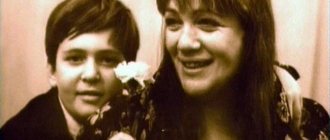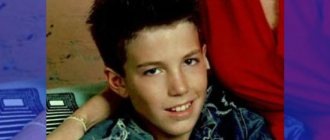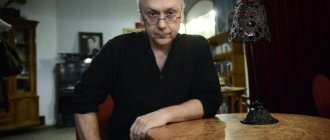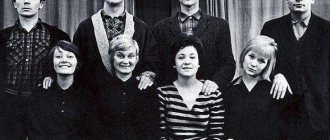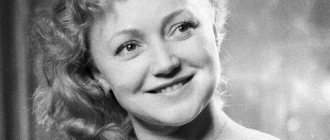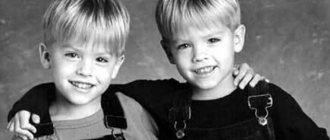Name: Zinovy Gerdt Date of birth: September 21 Date of death: November 18 Years of life: 1916-1996 Where was born: Vitebsk province of the Russian Empire Height: 163 centimeters Nationality: Jew Zodiac sign: Virgo Eastern horoscope: Dragon
This outstanding actor There were a lot of fans of Russian theater and cinema, and his work delights art lovers to this day. It is noteworthy that he did not have a Hollywood appearance or outstanding physical characteristics, but he was richly endowed with charm. We bring to your attention an article about the biography and personal life of Zinovy Gerdt, a wonderful person and a true master of acting. His friends affectionately called him Zyama, and the audience simply adored him...
Zalman Khrapinovich, as Zinovy Efimovich Gerdt was originally called, was born in September 1916 in the town of Sebezh, Vitebsk province, in Belarus. His parents were not rich people: his father Afroim Yakovlevich first worked as a cab driver, then was engaged in commerce, was a clerk and traveling salesman, and under the Soviet regime - an employee of the regional consumer union. Mom, Rakhil Isaakovna, took care of the housework. Zinovy became the fourth child in the family, the youngest of the Khrapinovichs. He had a brother Boris and sisters Fira and Bertha.
Childhood and youth of the actor
The future artist spent his childhood in his homeland, in the town of Sebezh. The boy studied at a local Jewish school, from childhood and adolescence he was interested in art, in particular poetry, and wrote poetry himself from a very early age. The boy's gift as a poet was discovered by his school literature teacher. A poem about collectivization in Yiddish, written by thirteen-year-old Khrapinovich, was once published in a regional newspaper.
In the late twenties, Boris Khrapinovich moved to Moscow, got married there and stayed to live. In 1932, Zinovy moved in with his brother and entered the Kuibyshev Electric Plant School. There Zyama met and became friends with Isai Kuznetsov, who wrote stories and scripts, and at the same time played in the theater of working youth for director Pluchek. Khrapinovich, following the example of a friend, also signed up for the troupe. After graduating from college, Zinovy got a job at Metrostroy as an electrician, not forgetting about the stage. In 1935, the talented boy was transferred to the professional theater staff. And a little later I received an invitation to the Puppet Theater at the Palace of Pioneers.
In 1939 he ended up in the Arbuzov Studio with Valentin Pluchek and Alexei Arbuzov. The latter suggested that his pupil take a pseudonym in honor of the popular ballerina Elizaveta Gerdt in the twenties. In 1947, Zinovy Efimovich documented it in place of the official surname.
Memoria. Zinovy Gerdt
Zinovy Gerdt, actor, was born on September 21, 1916
Private bussiness
Zinovy Efimovich Gerdt (Zalman Afroimovich Khrapinovich, 1916-1996) was born in the district town of Sebezh, Vitebsk province (now Pskov region, Russia). His father, Afroim Khrapinovich, worked as a clerk in a fabric store, then managed a grocery store and was a pious man; mother, Rakhil Isaakovna, was a housewife. Zinovy was the fourth child in the family. He studied at a Jewish school in Sebezh, and in 1932 he moved to his brother in Moscow. In 1934, after graduating from the factory school of the Moscow Electric Plant named after Kuibyshev, he went to work at Metrostroy as an electrician.
He began acting in the Theater of Working Youth (TRAM) of the Central Committee of the Union of Power Plants immediately upon entering the FZU in 1932, and after 3 years he was transferred to the professional staff of the theater. In 1936-1937 he was an actor at the Puppet Theater at the Moscow Palace of Pioneers. In 1938, he was accepted into the Moscow State Theater Studio, organized by Alexei Arbuzov and Valentin Pluchek, where he worked until the start of the war. Initially he performed under his real surname Khrapinovich, then under the artistic pseudonym Gerdt, which in the late 1930s became his official surname (the first and patronymic Zinovy Efimovich appeared after the war).
In June 1941, Zinovy Gerdt volunteered for the front. In December 1941, he graduated from special short-term training at the Moscow Military Engineering School and was sent to the Kalinin and then to the Voronezh Front. He was the commander of a sapper company with the rank of senior lieutenant. On February 13, 1943, near Belgorod, he was seriously wounded by a fragment of a tank shell. After eleven operations, the most important of which were performed by the leading surgeon of the Botkin Hospital, Ksenia Vincentini (wife of designer Sergei Korolev), Gerdt was spared his damaged leg, which, however, has since been 8 centimeters shorter than the healthy one and forced the artist to limp heavily.
After the end of the war, Zinovy Gerdt worked for almost forty years - from 1945 to 1982 - in the troupe of the Central Puppet Theater under the direction of S. V. Obraztsov. Since 1983, he moved to the MADT named after M. N. Ermolova.
Zinovy Gerdt entered cinema as a dubbing actor, remaining behind the scenes for a long time. On television, from 1962 to 1966, with breaks for touring and filming, he hosted the Kinopanorama program, but due to scheduling difficulties, he left the television program. In the 1990s, Gerdt was the host of the author’s program “Tea Club” on the TV-6 Moscow channel. In 1991, he took part in the last episode of the capital show “Field of Miracles” with Vladislav Listyev. On December 29, 1994, I visited Vlad Listyev in the last episode of the Rush Hour program of 1994.
Died on November 18, 1996 in Moscow. He was buried at the Kuntsevo cemetery.
What is he famous for?
Zinovy Gerdt
At first, the Soviet audience recognized and fell in love not with Zinovy Gerdt himself, but with his voice, which sounded from behind the screen of Obraztsov’s puppet theater - for decades, Gerdt voiced the entertainer of Aplombov’s “Extraordinary Concert”. This was one of the most famous performances of the Soviet theater: it was performed on stage four thousand times, and the theater traveled with it to four hundred cities and twenty-nine states.
Then Gerdt’s incredible, stunning voice came to television screens - the actor voiced many films and television films, dubbed French and Italian films (Jean Gabin and other world screen stars spoke in his voice). And it was impossible not to fall in love with this voice.
In the sixties, Gerdt himself began to appear on screens, immediately earning fame as a “master of episodes.” He starred in dozens of films - “City of Craftsmen”, “City Romance”, “Taming the Fire”, “Car, Violin and Blob the Dog”, “Shadow”, “Stove-Benches”, “Straw Hat”, “The Meeting Place Cannot Be Changed” ", "Golden Calf", etc.
Zinovy Gerdt was loved by millions of viewers not only as a wonderful actor, but also as the embodiment of honor and dignity, wisdom and wit.
What you need to know
Zinovy Gerdt was a great expert and connoisseur of Russian poetry. He could spend hours reading Pushkin, Samoilov, and especially Pasternak, whose works he knew by heart.
On Zinovy Efimovich’s eightieth birthday, September 21, 1996, Deputy Prime Minister Viktor Ilyushin came to his dacha to present him with the Order of Merit for the Fatherland, III degree. Those who were preparing the visit put a bookmark in the volume of Pasternak for Ilyushin - and, having presented the order, he opened this volume on the bookmark, saying that he wanted to read aloud to the birthday boy the poem “It’s Ugly to Be Famous.”
According to the recollections of those present at this scene: “Gerdt reacted immediately: “Let me read it to you!” And Ilyushin has a protocol, he was preparing... No, he says, I did it myself. Then Gerdt, the genius of compromise, says: “Let’s do this: a line for you, a line for me...”
And now you can imagine the picture. Ilyushin (from the book): “Being famous is ugly...” Gerdt (by heart, conducting with his beautiful right hand, soaring to the beat): “That’s not what lifts you up...” Ilyushin (from the book): “No need to start an archive...”
And so they move through the text, and everyone except the Deputy Prime Minister gets chills, because everyone remembers the last line of the poem. A line that, in the context of Gerdt’s physical condition, would be better left unsaid.
Gerdt himself saved the situation (he was the first to figure out the impending awkwardness). And when the Deputy Prime Minister muttered: “It’s a shame, it means nothing...” - Gerdt, pointing to himself, finished: “To be a byword on everyone’s lips...”
And he laughed, interrupting this official invention. The last stanzas were not read.”
Direct speech
Oh, extraordinary Gerdt,
He has kept it since the war
One of the best features:
Knee-he-adamant.
V. Gaft
“He did not change in the most important thing - in the naturalness of his behavior. Any pose was alien to him. He never betrayed himself. No one has ever seen his signature on dubious letters pleasing to his superiors” - about Zinovy Gerdt, his friend Isai Kuznetsov
“Gerdt has a special reputation. He, playing only “for those who understand,” as Bulat Okudzhava put it in one of his songs, created his own special audience of people close to him in spirit. Gradually this audience became multimillion-dollar. This has only happened to poets before,” Mikhail Lvovsky.
“An unfading adornment of our lives,” Alexander Shirvindt about Zinovy Gerdt
5 facts about Zinovia Gerdt
- At the age of thirteen, Zinovy Gerdt wrote poems in Yiddish about collectivization, which were published in a children's newspaper.
- Among his friends and family, Gerdt is known by the diminutive name Zyama. In the theatrical environment he was called “The Great Zyama”, the master of episodes.
- The pseudonym Gerdt was suggested to Zinovia by Alexey Arbuzov after the name of the ballerina Elizaveta Gerd, popular in the 1920s - “Only necessarily - Gerdt! With a "t" at the end!
- On foreign tours of the Obraztsov Theater, Gerdt always voiced the entertainer Aplombov in the language of the country in which the theater performed. Usually he went on tour several days earlier than other actors, found a journalist or playwright who spoke Russian, and together with him he went through the text from beginning to end, “memorized” it, and at the end of the tour he safely forgot it.
- In Kyiv, on Proriznaya Street, a monument to Panikovsky was erected, the prototype for which was Zinovy Gerdt, who played the role of the same name in the film adaptation of the novel “The Golden Calf”. Another monument - to Gerdt himself - was erected on September 21, 2011 in Sebezh on the eve of the actor’s 95th birthday. The bronze and granite monument was made at the expense of city residents.
Materials about Zinovia Gerdt
Zyama is Gerdt!
Zinovy Gerdt. Zyama. – a film about an actor from the “ZhZL” series
Zinovy Gerdt reads Pasternak
War
As soon as the Great Patriotic War began, Zinovy volunteered for the army, although he could have used his armor. Before being sent to the front, the guy took a six-month course in sapper engineering, and in December 1941 he found himself on the front line. Khrapinovich was appointed head of the engineering service of the rifle regiment. He rose to the rank of senior lieutenant. Together with his unit, he experienced his baptism of fire on one of the August nights of 1942 in the battles for the village of Storozhevoye, located on the banks of the Don. The captured bridgehead was held by the division for five months.
In February 1943, near Kharkov, while working on clearing minefields for the passage of our tanks, Khrapinovich was seriously wounded in the leg by a shell fragment. After many operations, the officer’s damaged leg was saved, but it turned out to be 8 centimeters shorter than the second. As a result, the actor walked with a limp all his life.
Chapter One “I’M LUCKY—I’M FROM MYSELF!”
In every human heart there lives a covenant: to love your native land, regardless of its climate.
Midrash (collection of interpretations of the Bible)
Any biography begins with documents. Unfortunately, Gerdt himself did not write memoirs, did not keep a diary, or scrupulously collect evidence about his life. The earliest of such evidence is a sheet of autobiography, yellowed with time, written by him on June 21, 1945, upon entering the Sergei Obraztsov puppet theater:
“I, Gerdt Z. A., was born in 1916 in the city. Sebezh, in the family of an employee. After graduating from high school in 1932, he moved to Moscow, where he entered the F.Z.U school. Electric plant. After graduating from F.Z.U. in 1934, he worked for 1 year on the construction of the Moscow Metro as an electrician. In 1932, without interruption from production, he entered the Theater of Working Youth (TRAM) of the Central Committee of the Union of Power Plants, where, after working for three years, he was transferred to the professional staff of the theater as an actor. In 1936 he joined the troupe of the Puppet Theater at the Moscow House of Pioneers, where he worked as an actor until 1937. In 1938, he was involved in the organization of the Moscow State Theater Studio under the leadership of A. Arbuzov and V. Pluchek, where he worked until June 1941, that is, before joining the ranks of the Red Army. In December 1941 he graduated from the Moscow Military Engineering School and was sent to the Kalinin and then to the Voronezh front. In February 1943, in the battles for the city of Kharkov, he was seriously wounded and in September 1943 he was dismissed from the Army and deregistered under Art. 49 gr. II–III. Returning to Moscow, he entered the Moscow Youth Theater under the Directorate of Front-line Theatres, where he worked until June 25, 1945, that is, until the day the latter was liquidated. Group III disabled person of the Patriotic War."
Carier start
Until June 1945, Zinovy Efimovich worked on the stage of the capital's youth theater. Subsequently, until 1982, he served at the Sergei Obraztsov Puppet Theater. He came to the audition on crutches, but so captivated the theater management and Obraztsov personally with his performing skills that he was accepted without any hesitation. He toured abroad with the troupe, including Japan and the USA. It is interesting that the role of Eduard Aplombov in the sensational and once very popular puppet show “An Extraordinary Concert” was performed in the language of the country where the tour took place. As a result, the actor performed this image over five thousand times in 24 languages. Left the troupe after a conflict with the director.
Works in the theater:
- "Mowgli" (according to Kipling);
- “Devil's Mill” (based on Drda's fairy tale);
- “The Divine Comedy” (based on the play by Stock);
- "By magic";
- "Aladdin's Magic Lamp";
- “The Night Before Christmas” (according to Gogol).
09/21/1916, Sebezh, Pskov region - 11/18/1996, Moscow
Kinotavr Award in the category “Presidential Council Award for a Creative Career” (1996)
At the age of 15, after graduating from the factory school of the Moscow Electric Plant named after Kuibyshev, Gerdt came to work at Metrostroy as an electrician. At the factory club there was a theater for working youth (TRAM). Having read the announcement: “Come to us at TRAM,” Gerd did just that, and this changed his fate forever. At TRAM, Gerd played in the plays “The Marriage of Figaro” and “The Long Road”.
Zinovy Gerdt continued his artistic activity at the puppet theater at the Moscow House of Pioneers, where he got a job as an actor in 1937.
When the Great Patriotic War began, Zinovy Gerdt volunteered for the front. Senior lieutenant of the sapper company Gerdt did not remember that he was an artist, and did not even participate in amateur performances. In February 1943, near Belgorod, he was seriously wounded in the leg. The limp remained with him for the rest of his life. What kind of artistic activity could we be talking about?
Two years later, in 1945, Zinovy Gerdt returned to art. He got a job in the troupe of the Central Puppet Theater under the direction of S. V. Obraztsov. He worked behind the screen of this theater for almost forty years - until 1982.
A ventriloquist with a doll, he gave his voice to many characters, but the most famous is the narcissistic compere from “An Extraordinary Concert.” Without exaggeration, Gerdt won worldwide recognition in this role. In each country, he managed to lead the part of the entertainer in the local language (or even dialect), and was so convincing that simple-minded spectators - both in America, and in Japan, and everywhere else - firmly believed that the actor knew their language in detail. However, they are dealing with virtuoso onomatopoeia: Gerdt masters this art perfectly. Since 1983 - actor at the M. N. Ermolova Theater.
Zinovy Gerdt successfully worked on radio and television, was the first presenter of Kinopanorama, and hosted a number of popular television programs.
Zinovy Gerdt entered cinema as a dubbing and voice-over actor, remaining for a long time “behind the screen” like a puppeteer. The stars of the foreign screen spoke in Gerdt's voice: Toto ("Cops and Thieves" 1951), De Sica, Richard Harris, Peter O'Toole, as well as Yuri Yarvet in the role of King Lear. In the famous film “Fanfan-Tulip” (1952) he spoke for the author.
Sometimes Zinovy Gerdt appeared in films in episodic roles - in the film story “Man from Planet Earth” (the actor’s first episodic role), the comedy “Seven Nurses” (as Shamsky), and the fairy tale “City of Masters” (as an artist).
In the films “The Magician” (1967) and “The Golden Calf” (1968), Zinovy Gerdt was also invited to play episodic roles, but the directors saw greater potential in the actor. As a result, he played the main roles in these films, completely contrasting characters - the modest illusionist Kukushkin, whose happiness lies in bringing it to others, and the incomparable impudent and rogue Mikhail Samuelevich Panikovsky, a man without a passport, but in a straw boater and shirtfront. However, his Panikovsky was not just a despicable goose thief, but a swindler-poet and a glorious eccentric.
The roles of the magician Kukushkin and the swindler Panikovsky determined his acting future. Gerdt brought his own, sometimes different from the original, meaning to each film image, and did not resort to just one color in depicting a character. This reflected not only his craving for drama (he wrote several plays), but also his high intelligence and extraordinary talent.
Zinovy Gerdt played more than a hundred roles in films, including: Karl Sigismundovich from the school film “The Prank”, a cemetery watchman from the musical comedy “Three in a Boat Not Counting the Dog”, a man in a checkered coat from the comedy “Taimyr is Calling You” and three roles at once in the children's musical film "The Car, the Violin and the Blob the Dog."
Directors in love with the actor sometimes specially composed at least an episode for Gerdt. Not all roles were worthy of this great actor, but there is no doubt that he, with his biblical sadness in his gaze, ennobled each of them. And the fact that he twice played Babel’s Arie-Leib from the synagogue of cabbies - in the films “The Art of Living in Odessa” and “The Binder and the King” seems self-evident. Who else if not him is this hero in terms of capabilities and rank?
In the acting world, Zinovy Gerdt has become that very natural phenomenon about which they say: “Violates all the laws of physics.” Director Pyotr Todorovsky, who discovered Gerdt for big cinema in the film “The Magician,” recalls one of the artist’s last interviews, when he was already very ill, and it seemed that the film crew had come in vain: “When they said “Motor!”, the artist woke up in him, the illness went away , he transformed, began to speak into the camera.”
Zinovy Efimovich’s wife, Tatyana Aleksandrovna Pravdina, has nothing to do with the artistic environment. She is an Arabic translator. They met Gerdt when she was offered a job as a translator during the Obraztsov Theater’s tour to Egypt, Syria and Lebanon.
Tatyana Aleksandrovna recalls that when applying for a job, she was given one condition: her height should not exceed 160 cm. At first, she could not understand what this had to do with her professional qualities, but then it turned out that during simultaneous translation she should not suppress the performer on stage with its mass. When Tatyana was introduced to Zinovy Efimovich, for some reason he asked if she had children. And when he learned that she had a two-year-old daughter, he was very happy and said: “It’s suitable” (soon this child became the closest person in the world to him). Their romance began in the cabin of the plane, and immediately after the tour they got married. Fate gave them 36 years of happy life...
Daughter Ekaterina became a film director. Her first husband was film director Valery Fokin. From him Catherine has a son, Orestes. Second husband - Denis Evstigneev.
Zinovy Gerdt was not spoiled by fame and stardom. He, of course, succeeded, but he himself always had the feeling that he was not the one he was reputed to be. The actor was always dissatisfied with his performance. When they expected him to come and make everyone laugh, Gerdt suddenly read Pasternak’s piercing poems. He was removed from hosting Kinopanorama for the then unacceptable “I think” and “I believe” on television, and he reflected on the nature of Churikova and Chaplin.
With his life and his work, he deserved the love of the people. Moreover, they loved him not as an actor or presenter, but as a person. The reason, apparently, is that Zinovy Efimovich is greater than any of his roles and their entire sum. A variety of people were drawn to Zinovy Gerdt, they wanted to communicate with him, be friends with him, they listened to him. In the last decades of his life, he became the moral reference point for several generations of filmmakers and viewers.
Zinovy Gerdt died on November 18, 1996, leaving us with the unsolved mystery of his talent, thanks to which he could turn even a small role into a page of big cinema.
In Kyiv, at the intersection of Proriznaya and Khreshchatyk, there is a monument to Panikovsky, the prototype of the monument was Zinovy Gerdt.
Filmography:
1956 The Gray Robber - reads the text 1958 Man from Planet Earth 1960 Leon Garros is looking for a friend 1961 Nine Days of One Year - reads the text 1961 Yurka - the pantsless team 1962 Seven nannies 1963 Attention! There is a wizard in the city - reads the text 1963 Newton Street, house one 1964 Returned music - reads the text 1964 Green Light 1964 Believe it or not - reads the text 1965 A year like life 1965 City of Masters - lyrics, actor 1966 Avdotya Pavlovna 1966 The Ballad of attic - reads the text 1966 July Rain 1967 The Magician 1968 Zigzag of Luck - reads the text 1968 Golden Calf 1969 At thirteen o'clock in the morning 1970 Taimyr - actor calls you, reads the text 1970 Urban romance 1970 Sports, sports, sports - reads the text 1970 Step from the roof 1971 Dauria 1971 Ilf and Petrov were traveling on a tram 1971 The life and death of nobleman Tchertopkhanov 1971 Shadow 1972 Men - reads the text 1972 Stove benches 1972 Taming of fire 1973 Paradise apples 1973 Salty dog - reads the text 1974 Car, violin and dog Blob 1974 Straw hat 1974 Countries new adults 1975 Love at first sight - reads the text 1975 I won't do it anymore - scriptwriter 1976 The non-transferable key 1976 Red and Black - reads the text 1976 My wife - grandmother - reads the text 1976 Prank 1977 The Twelve Chairs - reads the text 1978 The Life of Beethoven 1979 The Wife Left 1979 The meeting place cannot be changed 1979 Particularly dangerous 1979 Nightingale 1979 Three in a boat, not counting the dog 1980 Adam marries Eve 1980 The story of one slap on the head - reads the text 1980 Piggy Bank 1980 Say a good word for the poor hussar 1981 Be healthy, dear - reads the text 1982 Donkey skin 1982 Salesman birds 1982 Fairy tales, fairy tales, tales of the old Arbat 1983 A military field novel 1983 Mary Poppins, goodbye 1983 Boys 1983 I'll wait for you 1984 Without a family 1984 The hero of her novel 1984 And then came Bumbo 1984 Obstacle course 1985 White rose of immortality - reads the text 1986 Mine dearly beloved detective 1986 They were sitting on the golden porch 1987 Somersault over their heads 1988 Thieves in law 1988 The story of one billiard team 1989 The binder and the king 1989 Interdevochka 1989 The art of living in Odessa 1989 Peace be with you, shalom 1989 A trip to Wiesbaden 1991 Childhood Themes 1991 Lost in Siberia 1992 Manuscript - reads the text, actor 1993 I am Ivan, you are Abram 1994 Anecdote. history of Odessa in anecdotes 1994 Simple-minded 1994 Soldier Ivan Chonkin 1994 Overture 1996 Inspector 1997 Wind over the city 1998 The war is over. Forget it
Actors section
Work in theater and cinema
After parting with the Puppet Theater, Zinovy Gerdt worked for almost a decade on the stage of the Ermolova Drama Theater. In addition, the actor took part in the Sovremennik play based on Vetemaa’s play “Monument” in 1977.
In cinema, Gerdt's abilities were initially used exclusively for dubbing - his voice was truly unique, and later directors gradually began to cast him in episodic roles. But even in minor roles, Zinovy Efimovich showed himself in all his glory, sometimes overshadowing the main performers with his charisma and skill.
Perhaps, for the first time, attention was paid to actor Gerdt after the release of Rolan Bykov’s film “Seven Nannies,” in which Zinovy Efimovich played a small role of Professor Shamsky, the father of one of the main characters. Then he twice “crossed the path” of Bykov, for whom the main roles in the films “The Magician” and “The Golden Calf” were intended. In the last of them, Gerdt played Panikovsky, a petty provincial swindler, an accomplice of Ostap Bender. No one doubts that Bykov would have played one of the “children of Lieutenant Schmidt” superbly, but Zinovy did it simply brilliantly, turning this controversial image into his calling card for many years. By the way, Roland Antonovich did not complain at all that Gerdt deprived him of such gorgeous roles - there was plenty of work at that time!
The actor was offered the next more or less significant role in the 1970 comedy “Taimyr is Calling You,” directed by Alexei Korenev, based on the play by Alexander Galich, who was not yet completely disgraced at that time. Gerdt depicted a certain character in a checkered coat in the picture.
Subsequently, the artist was offered diverse roles, so he showed his talent to the fullest, it’s only a pity that the main roles in films were no longer given... Whoever was portrayed by a magnificent performer! He could convincingly transform into a hairdresser and conductor, a physics teacher and a jeweler, an anarchist and gravedigger, a poet and a parrot seller. For the genius Zinovy Gerdt, nothing was impossible; for any film crew he was his own man.
In addition to Panikovsky, the audience really liked: the accountant Monsieur Tardivo from “The Straw Hat”, Sharapov’s neighbor from the detective story “The Meeting Place Cannot Be Changed”, the judge from the film “Adam Marries Eve”, the cinema administrator from “Field Romance”, Admiral Boom from “ Mary Poppins, goodbye!”, lawyer from “Thieves in Law.” According to Wikipedia, the artist’s filmography includes almost eight dozen films and a dozen television performances, not counting many other projects.
Selected films with the actor:
- "City of masters".
- "City Romance".
- “Ilf and Petrov were traveling on the tram.”
- "Carnival".
- "Shadow".
- "A car, a violin and a dog Blob."
- "The key is non-transferable."
- "Nightingale".
- "The Bandit and the King."
- "Intergirl".
Zinovy Gerdt joked: Disability is not a deformity, but a human feature
Two wonderful artists, two public favorites, were born in different years, but on the same day - September 21. The charming, ironic, cheerful storyteller and joker Zinovy Gerdt and the gloomy, suspicious, picky Mark Bernes - they were different, but they equally drew full houses at their performances and were close people in life. There are many stories and legends about both. We decided to remember some of them on this day: I did not know Zinoviy Efimovich and only once called him with a request for an interview. But how I remember this call! Zinovy Efimovich listened to another journalist’s request for a meeting, but interrupted me: “My dear young man!” Help me. Do you have a telephone number for the Moscow TV channel? “Yes,” I answer. And so brazenly I ask: “Why do you need him, Zinovy Efimovich?” - You see, they just showed a story about a sick girl who needs help. They dictated the current account number, but I didn’t have time to write it down. I want to ask them to repeat it to me on the phone... And you call me tomorrow. The next day I ask: “Well, Zinovy Efimovich, did you find out the current account?” “No,” she sighs, “some girl from the channel promised to call me back, but she never called me back.” Of course, I’m not a rich person, but I could transfer some money to this girl... Why are people so irresponsible?! Gerdt still refused to give me an interview. He was already feeling unwell and rarely received anyone at his dacha in Pakhra, near Moscow. But, already seriously ill, he still appeared in front of television viewers at his anniversary party. He turned 80 years old. During the program, he could no longer get out of his chair, was forced to rest behind the scenes and swallow medications... And when suddenly at the end he stood up and read David Samoilov’s poem “Oh, how late I realized why I exist,” from those who saw it , tears welled up in my eyes. Reading memoirs about Gerdt, you always come across a lot of all kinds of tales about Zyama - as his friends affectionately called him. And in these stories, a wise and cheerful person is also revealed - Zinovy Efimovich Gerdt. One day Zyama drank heavily while visiting. I was returning home with my wife by car. The wife is driving, Gerdt is nearby. The car was Japanese, right-hand drive. A traffic cop stops the car, approaches Gerdt, smells the smell of alcohol: “What-oh! Drunk driving? To which Zyama immediately responded: “Where did you see the steering wheel?” The traffic cop took a closer look - there really is no steering wheel. I froze in place in amazement. And then Gerdt said: “Young man, when I drink, I always hand over the steering wheel to my wife!” In the thirties, the young unknown actor Zyama worked for the major director Vsevolod Meyerhold. One day the short Gerdt noticed how a tall, chic lady began to come to their theater. Zyama immediately fell in love and one day dared to approach the lady and invite her to the cinema. But the beauty only snorted in response. And then the resourceful actor asked Meyerhold to help impress the woman he loved. As soon as she came to the theater again, Gerdt began to hover nearby, and Meyerhold, who was passing by, loudly addressed Zyama: “My darling!” Well, why don't you come to rehearsals? Without your advice, I was completely confused, you know! It is absolutely impossible to work without you! “Okay, okay,” Gerdt answered arrogantly, “I’ll come tomorrow!” The funny thing is that this game of two theatergoers did not make any impression on the beauty. Gerdt didn’t see her again... After one of the concerts in Odessa, an artist who had just performed on stage approached Gerdt, who was present in the hall: “Well, how do you like it, Zinovy Efimovich?” - I like it. And people who have worse tastes are generally delighted... It is known that during the war Gerdt was the commander of a sapper company. In '43 he was wounded in the leg. As a result, Zinovy Efimovich limped all his life and always joked: “Disability is not a deformity, but a feature of a person!” FROM THE DOSSIER "KP" People's Artist of the USSR Zinovy GERDT was born in the city of Sebezh near Vitebsk. Since 1937 - actor at the Puppet Theater at the Moscow Palace of Pioneers. From 1945 to 1982 he was an actor at the Puppet Theater under the direction of Sergei Obraztsov. Since 1983 - actor at the Ermolova Theater. Played in the films: “The Inspector General”, “Soldier Ivan Chonkin”, “The Golden Calf”, “Thieves in Law”, “War Romance”, “Mary Poppins, Goodbye!”, “Say a Good Word for the Poor Hussar”, “ Straw Hat”, “Taimyr is calling you” and others. In Kyiv on Podol there is a monument to Panikovsky, whose prototype was Zinovy Gerdt in this role. By the way, we remind readers: we are waiting for your applications about which of your favorite actors, who may have only starred in episodes, you would still like to know about. Don’t forget to mark the envelope: “Idols of the past.” If Mark loved, then he truly loved! The artist’s widow Liliya Bodrova recalls. He took me by the hand and took me away from my husband. We first met in 1959. I brought my daughter to first grade, and Mark Naumovich brought his son. I was with my husband. I didn’t recognize Bernes at all. I push my husband in the side: “Look, Kryuchkov is standing!” And he said to me: “Stupid, this is Mark Bernes.” And my husband introduced me to Mark. Later we found ourselves sitting at the same desk together at a parent meeting. Well, then Mark was already courting me. He invited us to private screenings of films and walked around Moscow in the evenings. Mark often told me, “You need to leave your husband.” By that time, he himself was four years old - his first wife died of cancer. Once I was in the hospital. I’m being discharged home, and my husband asks me: “Is this true?” I understood what was going on. “True,” I say. Then the husband went to sort things out with Bernes. Together they rode back and forth to us. Bernes is in one car, my husband is in another. And when they stopped at traffic lights, they talked. Mark’s husband asks: “Did you give her roses?” “Yes,” Bernes answers. At the next traffic light the question again: “Did you sleep?” As Mark later said, he thought for a long time what to answer. If you tell the truth - “No” - then he will lose me. And he answered: “Yes.” They arrived home together, and Mark took me by the hand, put me in his car and took me to his place. We started our new life by renovating our apartment. Of course, it was difficult at first, we got used to each other, our children got used to it. And then it became easier. He had few friends. Mark was, of course, a difficult person. If he loved someone, he really loved him. Helped. For example, I remember helping Zhenya Yevtushenko with renovations in his apartment, getting a toilet for him. Back then it was difficult to get anything. And if Mark didn’t love a person, he said it to his face, without hiding anything. Because of his high demands and devotion in friendship, Bernes had few friends. One of his close friends is Zyama Gerdt. He demanded respect from children for their elders. He treated children touchingly, but demandingly. Once we arrived from concerts in Moscow a little earlier than planned, and I saw a pack of cigarettes on the table at home. The daughter admitted that it was hers. Then Mark sternly said: “If you already smoke, then smoke at home, not in the gateway!” Surprisingly, after this the children quit smoking. The persecution was carried out out of jealousy. The persecution of Mark was carried out by Nikita Khrushchev and his son-in-law Alexei Adzhubey. There was once a concert at Luzhniki, which Nikita Sergeevich himself was present at. Mark sang two songs, as he was supposed to, but the audience began to demand: “More, more!” Mark asked the organizers backstage: “Can we sing some more?” They refused. That's why I didn't sing anymore. And Khrushchev in the government box was surprised: “Look how arrogant this Bernes is?!” This played a major role. And at one time, Adzhubey and Bernes were together in love with the actress Isolde Izvitskaya. Naturally, she responded to Bernes's advances. So Adzhubey remembered this. Articles appeared in the central newspapers about how vulgar Bernes is, how badly he sings, and so on. Mark was worried. They began to invite him to concerts and to the movies a little. In recent years, he practically did not act and only sang. He didn't believe in cancer. Mark always complained about his heart. We didn't even talk about cancer. Although his dad, sister and wife died of cancer. Already in the hospital, he did not fully believe this diagnosis and hoped that he would recover. But he had inoperable cancer, and everyone knew what the outcome would be. I remember that shortly before his death he told his son: “Record a few of my songs on a cassette - “For three years I dreamed of you,” “Romance Roshchina” and “Cranes,” and play only them at my funeral service. No funeral music." But Mark said this as if as a joke. But we fulfilled his last wish. FROM THE KP DOSSIER Mark BERNES was born in the Kharkov region. At first he studied to become an accountant at the Trade and Industrial School, where his parents assigned him, but at the age of 17 he ran away from home to Moscow. At first he worked as an extra at the Maly and Bolshoi theaters. Then he became an actor at the Moscow Drama and Revolution Theaters. For the first time he played a major film role in Sergei Yutkevich’s film “The Man with a Gun,” where he sang for the first time (“Clouds rose over the city”). Then there were the films “Fighters”, “Two Fighters”, “Big Life” and others. Along with the films, songs performed by Mark Naumovich also became popular: “Dark Night”, “Scows”, “A Comrade Flies to a Distant Land”, “For Three Years I Dreamed of You” and others. He died in 1969 from inoperable lung cancer.
Voice acting and dubbing
In addition to working in theater and cinema, the artist was quite involved in dubbing - both in animation and in dubbing foreign and some Soviet films. The characters speak in Gerdt's unique voice:
- Toto in the movie "Cops and Thieves."
- Louis de Funes - in "The Beautiful American".
- Peter O'Toole in The Lion in Winter.
- Donatos Banionis - in "The Escape of Mr. McKinley."
- Mark Prudkin in the comedy “The Blonde Around the Corner” and many others.
In films and cartoons, and radio plays, Gerdt was often trusted to read the voice-over text. This was the case in the films: “Nine Days of One Year”, “The Career of Dima Gorin”, “Zigzag of Fortune”, “12 Chairs”, “The Story of a Crime”, “The Black Hen”, “The Adventures of Captain Vrungel” and this is only a small percentage of that list that could be published in full. The timbre of Zinovy Efimovich’s voice was simply mesmerizing - both adults and children.
Scripts and directing works
A common truth: a talented person is talented in everything - quite suitable for the personality of Zinovy Gerdt. Not only did he go on stage and work on the set, he also loved to sit in silence over a piece of paper and compose. Thus, Gerdt’s biography, in collaboration with other authors, includes scripts for documentaries:
- “Leonid Engibarov, meet me!”;
- “On the road, on the road”;
- “Parade-alle” (with Arkanov and Gutman);
- “We need to talk...”;
- "I won't do it again."
As a director, together with Kusov and Gutman he staged the puppet interlude show “Parade-alle”.
Death
Zinovy Efimovich lived for eighty years, the actor was seriously ill at the end of his life - neither his arms nor his legs obeyed Gerdt. The artist knew about the disease, but lived as if none of this existed, even his humor and intelligence remained the same.
On November 18, 1996, Zinovy Gerdt died; the actor’s grave is located at the Kuntsevo cemetery in Moscow.
The grave of Zinovy Gerdt at the Kuntsevo cemetery in Moscow
In 1998, a monument to the artist’s character, Panikovsky, was unveiled in Kyiv. In 2006, a monument was erected in the city of Sebezh to mark the 90th anniversary of Gerdt’s birth. In 2010, the AST publishing house published the book “Knight of Conscience,” written by Zinovy Gerdt.
TV projects and audio publications
In the period from 1962 to 1966, with short breaks caused by filming or touring, he hosted the Kinopanorama program on television. And in the eighties, he voiced movie reviews in the Kinoafisha program. In 1984, Ryazanov’s film “Cruel Romance” based on Ostrovsky’s play “Dowry” was released. Gerdt harshly criticized the famous director's interpretation of the classics, which gave rise to a quarrel. Ryazanov and Gerdt did not communicate with each other until the end of the decade, but then they made peace.
In the nineties, the actor was the TV presenter of the “Tea Club” program on TV-6, and participated in various television projects, for example, “Field of Miracles” or “Rush Hour.”
In 1973, she released the record “Dot, dot, comma...”, on which the text from the author is read by Gerdt.
In the nineties and two thousand, several CDs were released that featured Zyama’s original vocals. The legend of theater and cinema performs songs by Bulat Okudzhava, romances by Isaac Schwartz, hits by pop composers and folk songs.
A television
On television, Zinovy Gerdt hosted the program “Kinopanorama” from 1962 to 1966. Due to an inconvenient schedule, the artist left the TV show, Zinovy Efimovich was replaced by Alexey Kapler.
Zinovy Gerdt
In the 1990s, Gerdt was the host of the “Tea Club” program on TV-6, and participated in the capital show “Field of Miracles” with Vladislav Listyev. On December 29, 1994, he starred in the Rush Hour program.
The last time on television Zinovy Gerdt was seen in the “Tea Club” program on October 21, 1996.
Titles and awards
Over the years of fruitful creative activity, Zinovy Efimovich received many titles and awards. Among them we name the following:
- Honored Artist of the RSFSR (1959);
- People's Artist of the RSFSR (1969);
- People's Artist of the USSR (1990);
- Order of Merit for the Fatherland, III and I degrees - for great contribution to the development of art;
- Order of the Patriotic War, 1st degree and Red Star;
- “Kinotavr” film festival award for a creative career” (1996);
- title of honorary citizen of Sebezh.
Personal life and family of the actor
Unprepossessing in appearance, Zinovy produced a magical effect on those around him, especially on the fairer sex. Personal life, in general, was in full swing. Rumor attributed Zyama with multiple novels and a bunch of civil marriages, where, of course, there were some exaggerations. He was not a sexual giant, but he scattered vibes in all directions.
The first wife, Maria Ivanovna Novikova, drew attention to young Zinovy even when they were studying together in a theater studio. The guy reciprocated, and the young people got married. Later they were separated by the war, but the husband wrote heartfelt letters to his beloved from the front. And Masha waited for her betrothed. In 1945, the couple had a son, Vsevolod Zinovievich Novikov. However, Zyama’s love of love in his youth bore its “fruits”: the wife was tired of enduring her husband’s numerous infidelities, and she filed for divorce. It is known that the actor asked Sergei Obraztsov to transfer the entire salary intended for himself in the name of his son, but kept money for himself from other sources of income. In 1977, Gerdt had a granddaughter, Ksenia Vsevolodovna Novikova.
The second wife, Ekaterina Fedorovna Semerdzhieva, worked as a sculptor. The artist lived with this woman for 8 years.
When Gerdt turned 44, he officially married for the third time. The third wife, Tatyana Aleksandrovna Pravdina, worked as a translator from Arabic. Zinovy Efimovich was with her at the moment when he toured the countries of the Middle East with the theater. Tanya was 12 years younger than her chosen one. At first, the woman was skeptical and condescending towards the advances of a mature gentleman, but then she became seriously carried away. In order to be together, both partners had to leave their families.
The couple lived in marriage for 36 years - in love and harmony. The adopted daughter, Ekaterina (Pravdina) Gerdt, accepted her mother’s new man well and always considered Zinovy Efimovich to be her real father. Subsequently, Gerdt had an adopted grandson, Orest Valerievich Fokin.
Tatyana Pravdina said in an interview that her husband’s masculinity was very evident; she could rely on him under any life circumstances.
Death and memory of the actor
Towards the end of the actor’s life, various diseases took hold of him; just before his death, his arms and legs became paralyzed, but Zyama did not lose heart and did not lose his natural sense of humor. On November 18, 1996, Gerdt died.
Memory of the actor:
- 1998 - a monument to Panikovsky, brilliantly portrayed by Zinovy Gerdt, was opened in Kyiv.
- 2001 - a book of memoirs of friends and relatives “Zyama is Gerdt!” was published.
- 2010 - Gerdt’s author’s publication “Knight of Conscience” appeared on the book market.
- 2011 - in the actor’s small homeland, Sebezh, a sculpture of Zinovy Efimovich was erected with donations from city residents. The opening ceremony of the monument was attended by the widow Tatyana Pravdina and actor Alexander Shirvindt.
Matvey Geyser. Zinovy Gerdt
I dedicate this book to my student and assistant Yulianna Medvedeva
An artist is not at all the same as an actor. The artist lives without any acting. He is the one who, accepting the verdict, Blames only before the court of posterity.
The interpreter of times, flattened on the screen, He translates correctly, but in the end it is not at all what the tyrant announced, But what the gods muttered to him.
D. Samoilov - Z. Gerdt, August 10, 1987
